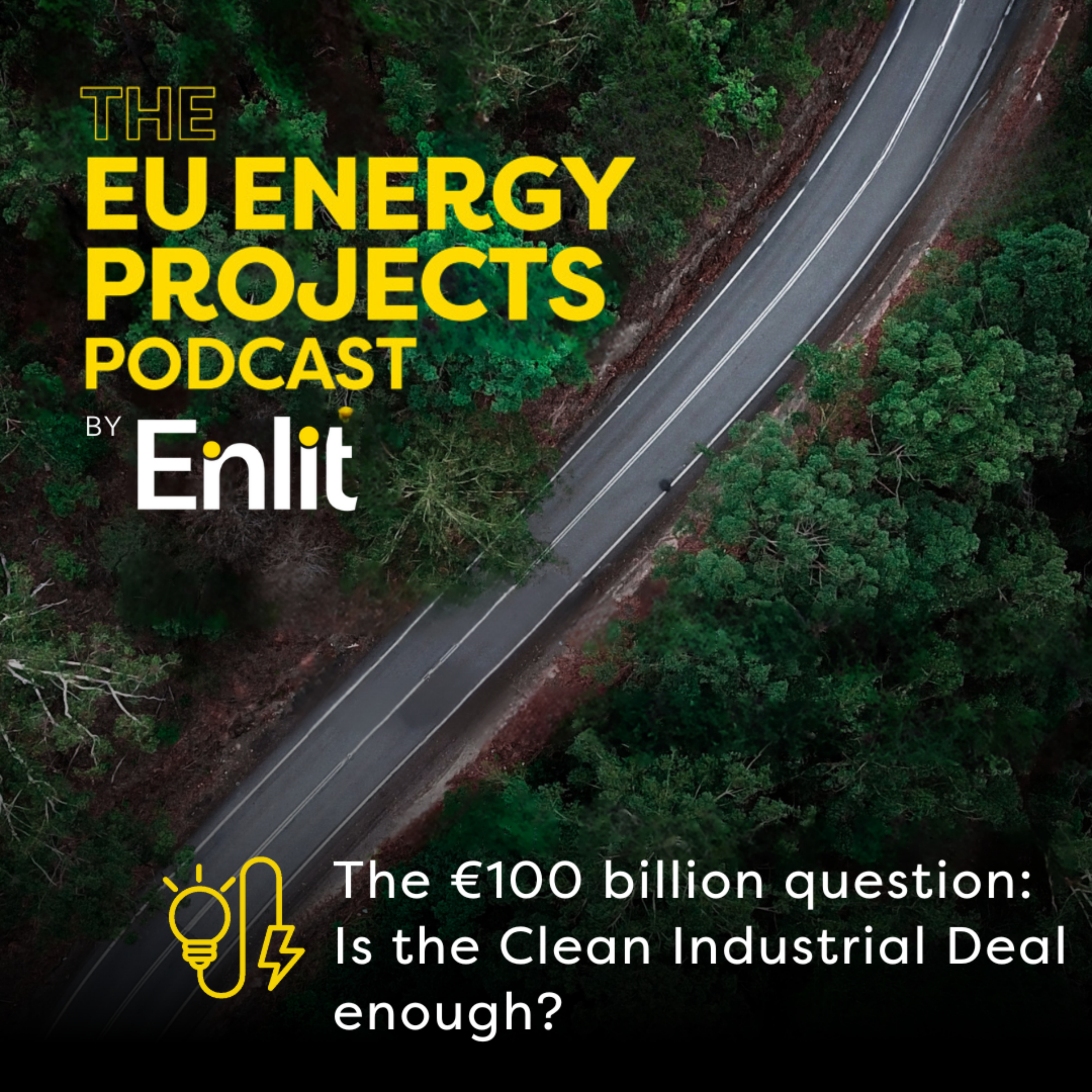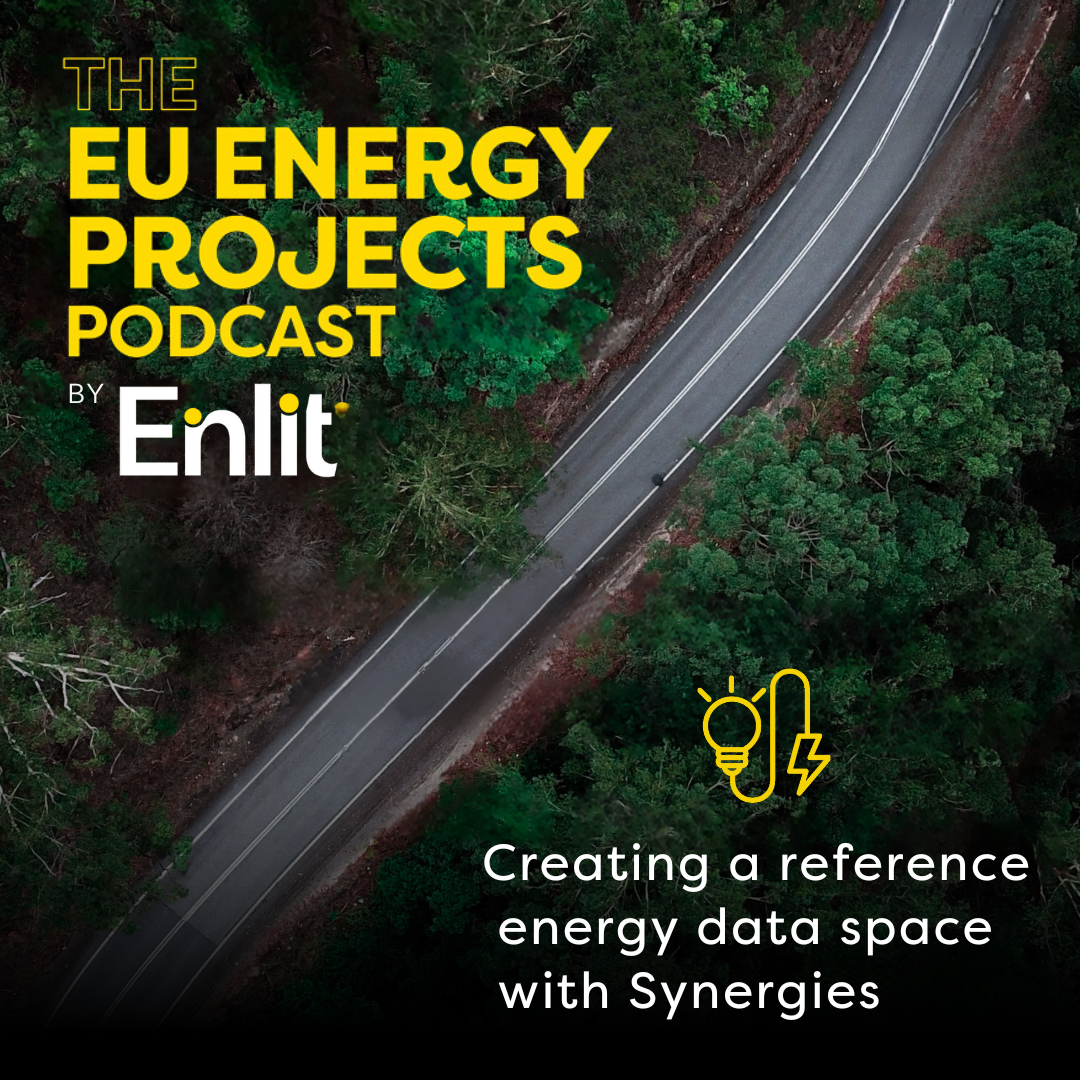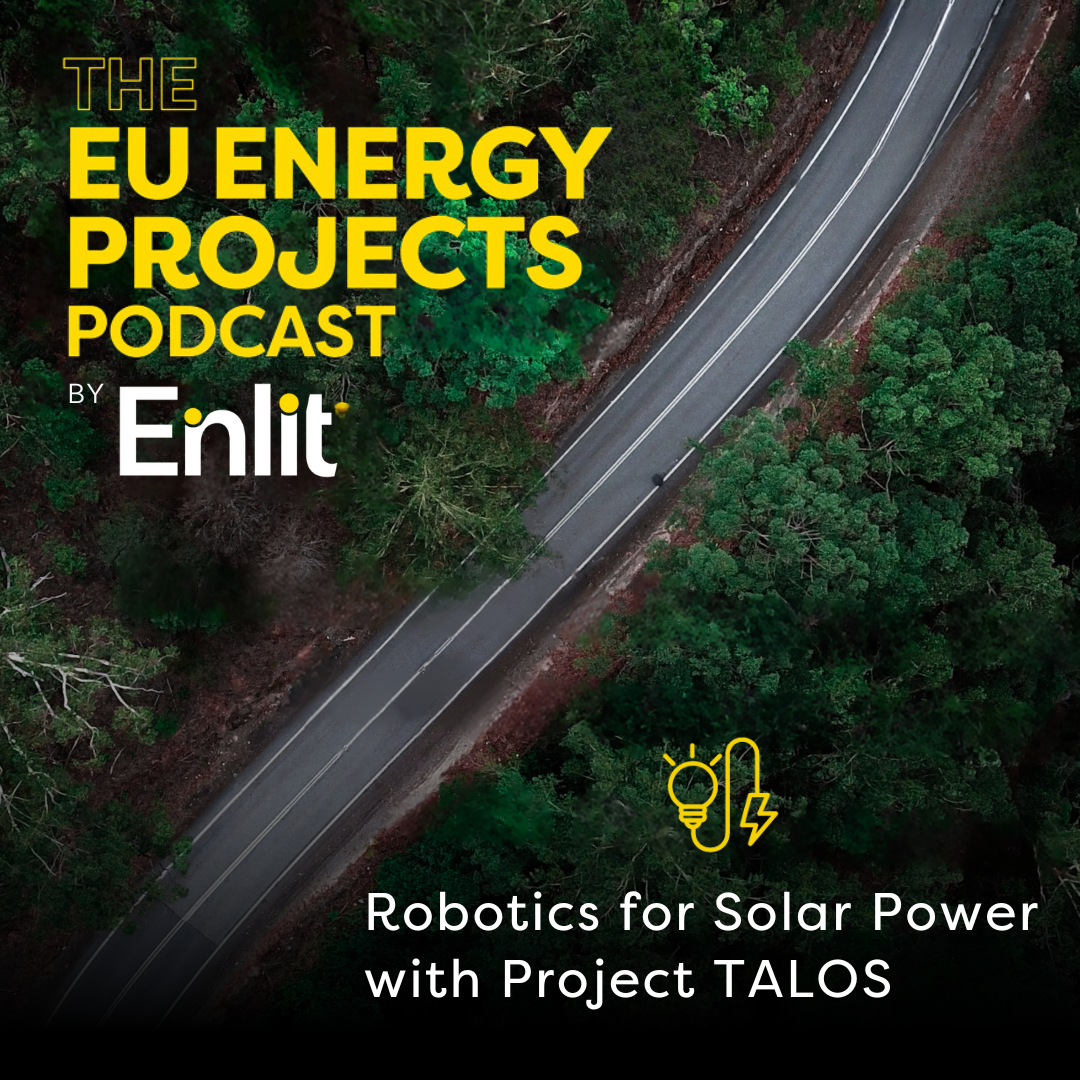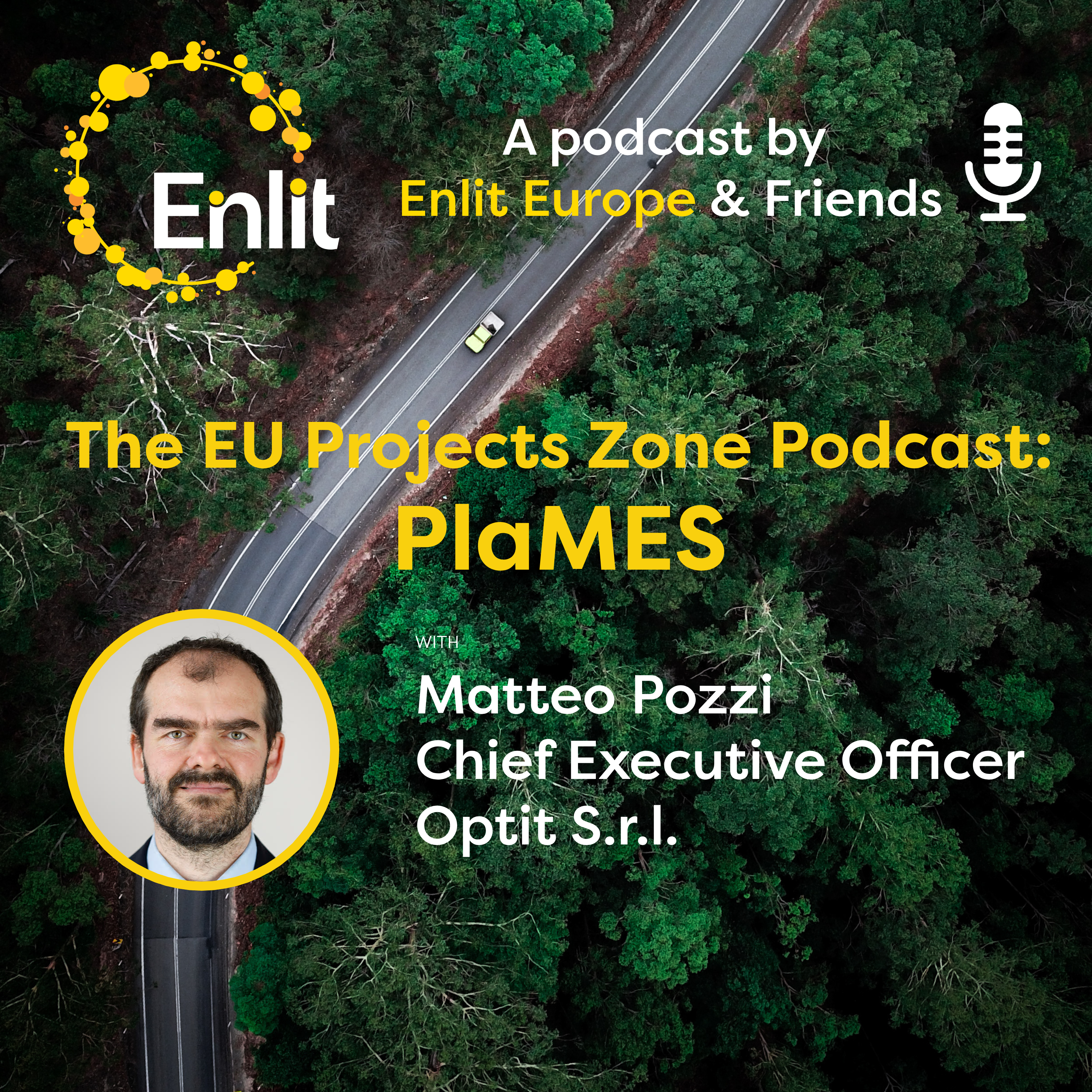Episode Transcript
[00:00:10] Speaker A: Welcome to the EU Energy Projects Podcast, a podcast series from Enlida and France focusing on the clean energy transition for the European Union and the EU Commission funded energy projects that will help us achieve it. My name is Aretid Daradimu, I. I am the editor of the EU Energy Projects Podcast and your host.
In this episode of the EU Energy Projects Podcast I have the opportunity of picking the brain of Ivan Mattel, Director for the SAT Plan and Strategic Programming at the European Energy Research alliance or era in our discussion we will touch upon the Clean Industrial Deal Affordability Plan, but also research and innovation within the EU energy sector, a very important topic.
Ivan, thank you very much for joining me today and I would like to start immediately by asking you, could you please explain in a nutshell what is the main focus of era, the European Energy Research Alliance.
[00:01:18] Speaker B: Good morning Areti and good morning to ENEL Community and thank you very much for having me this morning to talk about many interesting aspects related to the low carbon energy sector. So the European Energy Research alliance is the largest energy research community comprising more than 250 university and research centers across Europe and we actually have also Canada member recently.
We have been established in 2008 and what we do, we try to catalyze European energy research to achieve a climate neutral society by 2050, but also intermediate goals set down by the Commission of 2030, 2040. We are formal research pillar of the set plan, which stands for the Strategic Energy Technology Plan, the normative framework that lays down the provisions how to reach those goals technology wise and to do that. ERA is structured in 18 joint programs to be considered as departments that cover a comprehensive range of all low carbon technologies and systemic topics. So for example, we have joint programs on technologies themselves such as phototikes, wind, geothermal. We have then systemic joint programs that tackle systemic issues of the clean energy transition, such as smart grids, smart cities, also social science, humanities, and finally we have joint programs dealing with materials such as nuclear materials, advanced materials. So in a nutshell, this is what we do. We catalyze European research to achieve the goals of 2050.
[00:02:53] Speaker A: So I would say that you would be the best person right now to tell us to give us an overview of the European energy sector today and how the Clean Industrial Deal and Affordability Plan fit into the EU's broader industrial strategy.
[00:03:09] Speaker B: Yes, thank you very much for this question, which is quite complex in its nature because it covers many things that have just recently published and in regards to the energy sector that as you know, it's undergoing a transformative shift driven by many goals, such as climate goals. Then we have geopolitical challenges and of course, the rapid advancement of the technologies themselves.
To consider the energy sector today, we need to start from the, from the main point, why ERA exists and why we do what we do today. And this is the climate urgency. Now we are rapidly approaching the 1.5 degree limits at the Paris Agreement, of course, and we know that the current efforts are not sufficient to keep global warming in the check. We have many scientific reports, so they're not just opinions that indicate that we need to scale up all that we have and we need to have radical actions to mitigate this risk. How to do that? It's by deployment of the renewables, by energy efficiency measures, innovative energy solutions and to reduce emissions as quickly as possible on top of this. So the urgency, climate urgency that we have, we have the notions of economic security and strategic autonomy that everybody talks about since three years ago and became even more prominent in the last six months.
These two notions have been highlighted by the Draghi Report as a cornerstone of the proposed European New Industrial Strategy. And in this context, we have recently published the Clean Industrial Deal and the Affordability Plan from the Commission, which we believe are the crucial elements to European industrial strategy. On one side, the Clean Industrial Deal is designed to support rapidly decarbonization of the European industry while maintaining of course competitiveness. Because this is what we talk about, how to boost European competitiveness in the global market.
It focuses on one side on the scaling up clean technology, manufacturing, assuring access to critical raw materials and reinforce industrial resilience against the global supply chain disruptions which afraid we are going to see also in the near future.
On another side, just for a plan to keep it on my mind, the Fability Plan complements what I just said by ensuring the cost effective energy supply, modernizing energy grids, reforming the energy market and decoupling energy prices and so on and so forth. All of this will cost a bunch of money.
The prospect is to invest 100 billion euros, which still don't know where this is going to come from. However, collectively these initiatives somehow underline the European commitment to integrate R and D and to boost European competitiveness and to ensure energy independence of the continent.
[00:06:12] Speaker A: Ivan, you raised a few topics, a few issues here. One is where the money will come from. The second is the two plans, the Deal and the Plan. Actually the Clean Industrial Deal and the Action Plan for Affordable Energy. Are they truly addressing core challenges or are they just a set of measures with limited real world impact?
Also, in a geopolitical environment that is becoming more and more, let's say, difficult for Europe. Are they enough or should they be our number one priority? So I don't know. Would you like to give me your thoughts?
[00:06:48] Speaker B: Of course. We can argue that whatever we put in place, it's not sufficient to cope with the increasing challenges that we have ahead. The energy challenges, I said climate and final geopolitical. And the last one, it's somehow defining whatever we are doing today. It's sufficient to open newspapers every day or listen to the radio and you will see how maybe this 100 billion that the Commission has proposed, it's not sufficient, but it's going to be financing. Just to start with your first Fritva's question, the Commission has in mind to set up the clean industrial deal state aid framework. So it should be reshuffled a bit. What are the rules of the state aid today, which is quite prescriptive and just few states can permit themselves to, well, take advantage of state aid. And I think above all Germany, we know that Germany can dismiss the state aid in much easier way than Italy can do or Belgium itself. So I'm taking this call from Belgium due to the restrictive Maastricht criteria. So then the Commission wants to establish the Sovereignty Innovation Fund to set up Industrial Decompensation Bank. So all these, let's say, provisions that can help, but there are big challenges. It will take long to establish those. Let's just not forget that the energy policies are still under the national monopole somehow. So all this that we are talking about should be somehow adopted by the member states one way or another and should agree to put plenty of money on plate to address this thing. Let's think also about the fact that this Clinton deal now has to challenge also the rearm policy of the European Union. That said, it need 800 billion, you know, to rearm Europe for the future purposes. So I don't know where this money will come from. And we should be sufficiently, let's say pragmatic and European and the member states European Commission should be also flexible to be able to address the challenges that still are to come. So to answer your questions, yes, this is a good basis to do that. But still we need to understand how this is going to roll out.
[00:09:15] Speaker A: Did you know that Enlit has another podcast, the Energy Transitions Podcast is a broad ranging bi weekly podcast about the people accelerating the energy transition in Europe and beyond. You can find it on Spotify, Apple or wherever you enjoy your podcasts.
Ivan, you mentioned rearm, of course, which in my opinion, could also look at the energy sector because you can't really arm Europe if, for example, you don't have the energy to do it. But also the 100 billion investment in clean manufacturing that the clean industrial deal brings, will industries truly see tangible benefits from that, in your opinion? Or will red tape slow progress? Will it take forever? Bureaucracy will pick it up and we will not see any, let's say, benefits until it's perhaps late.
[00:10:15] Speaker B: Let's stay. I think that of the world today, we need to also to stay a bit positive and to take this initial European Commission as a real radical shift of its policies. Of course, the adoption of the provisions of the Clindustine deal and affordability plan will depend very much about readiness of the main stakeholders to take it, to take all that is there as a proper engagement to face the challenges.
[00:10:43] Speaker A: You mentioned research and innovation and I was thinking that low carbon research and innovation is considered central to Europe's future competitiveness. However, when we have, for example, the United States going for a dogma of, as President Trump said it in his inauguration speech at the Congress, drill, baby, drill. Why are we only looking at low carbon research and innovation and how will that affect us?
[00:11:13] Speaker B: Well, you know, I started this, my intervention, saying that the first challenge that we have to face and we have to be aware of and then nobody speaks about it's a climate challenge, 1.5 degree. It's not just an opinion, it's something that will affect lives of all of us, specifically on the, let's say, geographically limited continent as it's Europe. So I don't think that we can afford, you know, expanding any kind of drills, of any kind of investment in the fossil fuels that will not affect immediately the European citizens. Now, Aaron Dyne Wall Carbon technology and it's not just opinion of era, but it's also laid down in the many reports that I mentioned later. Report, hate report, drug report, the R and die. It's vital for European competitiveness because of it, to assure European strategic autonomy. It will assure European industrial leadership and economy resilience. I don't think that investment in obsolete technologies will help to overcome the challenges which are very, very pressuring now. We need to also be aware, as you say, that European Union does not invest so much in the rdi. We are lagging behind respect to other countries. We promise that we'll invest 3% of GDP in R&D and we instead invest 2.2, which is behind, let's say European United States, which are around 3.5. China 2.4 and then we have also South Korea and so on. Nonetheless, investing R and I will help us to boost European economic security will help us to face higher energy prices. This is another topic. We are not competitive because we have higher energy prices. Just think that China has generally the lowest manufacturing cost for energy technologies and materials which compared to European Union it has advantage of 45%. And then we need to invest R and dynamic technologies because European Energy agency estimates that 35% of the required CO2 reductions will depend on technologies that don't exist. So this is why we need to invest in the low carbon technologies and there is not an alternative. And let's just be clear about it. European Unit cannot shift its priority because there is a guy sitting in the White House shifting its own nation priorities at proper will. We need to be consistent with our policy and with the promises that we have given to the European citizen, to European industry and also to entire world.
[00:13:58] Speaker A: Ivan, one could argue that the person that sits at the White House has a lot to say about the energy sector in Europe and worldwide in general. And there are many in Europe that are saying that because of President Trump's actions, Europe has been forced to follow Draghi's suggestions. According to the Draghi paper. Would you agree to that and would you say that reforms or policy shifts are needed to also defragment the EU's R&I landscape and create a more cohesive innovation ecosystem?
[00:14:35] Speaker B: Of course. So Draghi report just for clarity was issued before Trump took over his second mandate and Draghi was very clear about. He already dead stated that we have a big big challenges in front of us that we need to change radically or otherwise the Europe will perish. So what he proposes there is that we need to invest around 800 billion per year to the competitiveness which will amount to around 4.5, 4.7 of the GDP with the energy transition as the largest investment category. Now on top of it, just to mention for compliment that what the drug has said is a hater report on because we're talking about R&DAI. So I hit a report on the next framework program that he sees increase of 220 billion of the budget.
So to again to address all the challenges what we need to do here. Of course. So we said that we need to scale up this funding mechanisms. One is the policy shifts so that we are able to focus on entire spectrum research, development, innovation across all technology readiness levels so called trios. We need to also take care of that one. Then we need to reduce bureaucracy as one of the policy shifts, which I think it's very, very, very important.
And perhaps we should also focus on the high impact areas by directing funding towards the key technologies where still we have some competitive advantage. But this is and virtual topic on itself.
[00:16:13] Speaker A: I would like to ask you on public private collaboration because this cannot only be the EU Commission and some associations or some platforms that work with the Commission, a role needs to be played also by private companies.
So what role would you say? Public private collaboration plan scaling up R and I funding and bridging the gap between research and commercial deployment.
[00:16:41] Speaker B: So the public private collaboration until now in Europe proved to be good and one of the best lessons learned so far. But again with plenty of space for the improvement. The PPPs are essential for funding of the Clenergy R and D particularly in scaling up all the pre commercial technologies because the public funding is not sufficient. But to make this happen, the governments and European Commission should offer proper de risking mechanisms such as guarantees, grants and some blatant financing to attract private investments. Now what we have at European Energy Research alliance working on, it's something that would boost the creation and establishment of so called innovation hubs and clusters in Europe that should focus on the low carbon technologies that can foster an environment of collaboration between research institutions, industry, governments and so on. And these hub and clusters should act as European technology valleys, something as a silicon valleys at that time. And that should really help for the market uptake and scale up and to directly support the goals of European green deal but also industrial deal and so on, so forth.
What also we consider and when you look at the PPPs and you will look in the financing of the technology solutions, it's lack of the venture capital in Europe we don't have in European Commission this similar mindset of risk taking. So the venture capital for the breakthrough innovations are just at the beginning European Commission in European Union. So we need to find a way how to front what we call the value of death, you know, so the gap between early stage innovation and market entry. So this is also. We need to think about how the PPP can help to overcome this this problem.
[00:18:49] Speaker A: Ivan, we are discussing and we also mentioned low carbon technologies, but what are the most promising ones? And can EU achieve global leadership? Because it seems to me that we're missing a little bit the train with China, with the us with India, with everybody getting into the renewables game, for example. And should the EU focus its resources selectively on critical value chains where global leadership is possible or not?
[00:19:19] Speaker B: This is a very, very important question and quite Complex question that's not so easy to answer in just few lines.
As I said before, when I started talking to you, I said that the manufacturing of the technologies that we need should be considered with respect to both their geopolitical dimension and geo economic. So we should think about them how this technology relates to the European Union strategic autonomy and how it relates with European Union competitiveness. Now we know the European Commission has adopted traditional technology neutrality approach, which means that all the technologies that we have available are successful for the transition to net zero economy. And it's true. So whatever we need now, we need to deploy and use to reach the goals of 2030, 2040 and 2050. But we should be aware at the same time that the European global leadership can only realistically be achieved if we select a range of them.
Why? Because it will require the success of transition, will require that the range of the least cost technologies are used, not necessarily all of them. So to preserve the European strategic autonomy, we should perhaps differentiate it from the proposition to maintain industrial leadership on all required technologies and perhaps to build the leadership on the selected number of the technologies. Proposing on another hand a comprehensive de risking strategy where we are not sufficiently competitive.
So what also ERA produced in its recommendation recently is that we have that we should assess, let's say, this competitive landscape of the clean technologies. And this assessment should be performed on the continuous basis. And this is why what we have also written, we advise to establish independent European Union energy strategy agency that would be tasked with the mission of carrying out such a strategic assessment. So which technologies can really boost European competitiveness? Which technologies we may also consider we lost competition to other big geographical realities and how to de risk our independences. Which one? You know, it's very difficult to talk about which is technologies. But for sure we should continue invest in those value chains that we still keep, let's say advantage and which first come in mind, it's a wind energy. So for example, in that one we need to. What I was saying also before trying to leverage on the private funding by creating a new innovation hub or clusters of collaboration between R and D industry and member states. So this can be one of the technologies, but there are many others.
[00:22:25] Speaker A: Is nuclear one of them? For example, because there has been a lot of discussions about nuclear. We have Germany's example that opted out of nuclear and seems to regretting it. We have France's example that did not opt out of nuclear and now seems to be doing well and other countries wanting to follow its example.
[00:22:49] Speaker B: What would you say nuclear energies and the Taxonomy of the European Union are one of the technologies that we can help to reach goals of 2030 and 2050. So if all the instruments are put in place to develop those into quite, let's say limited time frame and with very stringent national European rules, then of course it can help. So we have small modular nuclear reactors developing in France for example, but also developing new Finland that can be deployed. And this in particular maybe for energy intense industries so hard to date industries.
[00:23:27] Speaker A: Hydro energy and hydrogen also seem to be in the mix because I fear that wind, solar, etc. We already kind of lost the game there. Or am I wrong?
[00:23:39] Speaker B: Well, now depends. You know, when talking about losing games, it's. It's very difficult because if we had a competitive advantage in the PV 20 years ago, we don't have it anymore. It doesn't, it doesn't mean that we shouldn't still at least invest in the part of the value chain that can help us again to reach the goals of 2050. So not to disrupt completely on the wheat, we didn't lose it at all. We still have a competitive advantage. And hydrogen, of course, it's the major alternative for industrial decarbonization again, provided that it has all the segments in place, for example infrastructure which still it's not there, but also all the funding scheme that are supported. But this regards not just hydrogen, it regards all the renewable carriers and the renewable energy sources. So we need to work on a proper coordination between N and die trade policies, economy policies and legislation to make this happen for entire array of the technologies. But also with time and quite soon consider which technologies we should focus on to boost our competitiveness and maintain advantage compared to other countries.
[00:25:00] Speaker A: It all comes back to money all the time. Every time we discuss something, it comes back to money. Who is going to finance it and also who is going to finance our aging grid. That really needs some updates there, especially if we're going to introduce renewable energy sources into it. But let's talk a little bit about trade because EU has championed an as open as possible, as closed as necessary approach in it. How should the EU manage critical interdependencies in clean energy supply chains to reduce reliance on non EU countries? Does this principle apply to the energy sector as much as it does to trade in general and clean technology partnerships?
[00:25:48] Speaker B: Yes, I will use what I suggest, closing the previous argument. So to make clean industrial deal to deliver the real impact, we need to have a comparison of approach between the trade policy, industrial strategy and financial mechanisms. And that means that we need to, we need to remain competitively globally and to prevent to be undercut by the lower cost imports. And because this is exactly what is happening.
So you mentioned as open as possible, as close as necessary. So I think that first of all the European Commission, the European Union should strengthen the trade policies to ensure fair competition. We are competing in the global clean energy race. We know that major economy are heavily subsidizing their own clean tech industry. Just take China, South Korea. But United States still continue to do so. So without strong trade protections, I think that European companies will risk that they're risking losing market share to these cheaper and state supported imports. So what we can do here we have something already in place. So we need to expand the carbon board and just mechanisms. I think this is already good mechanism. But we need to ensure that important goods reflect the true environment costs.
For example, coming from China, we need to apply trade defense measures. And what they think about here is to face anti dumping tariffs, which is again very much Chinese prerogative.
And we should negotiate strategic trade agreements with what we call like minded countries economists to secure critical raw materials and energy components. Now this last point, it's very tricky because you know, somebody can argue if still the United States like minded countries that we can rely on on the critical raw materials. So this is. This is a bit tricky. The good example of how this should work, it's the European batteries regulations era. It's part of the ATIP batteries. And we believe that European better regulations can serve as a blueprint for other sectors looking ahead.
[00:28:10] Speaker A: What are the biggest opportunities for Europe and what are the key policies or investment decisions that will determine whether we maintain our competitive edge.
[00:28:21] Speaker B: We as a Europe we have been doing quite well in recent decades. And this thanks to technology, expertise, innovation, ecosystem and quite solid regulatory framework. So we have a really strong foundation to lead the global clean energy transition. However, to do that we need to stay ahead in key areas of transformation of the modernization and sustainability.
So this is also the key word sustainability. How to do that? For sure, we need to advance on the clean energy technologies. So we need to set ambitious targets for expanding renewable energy. We need to enhance efficiency, affordability and sustainability where the deployment of renewables technology is not so easy. And we need to develop also energy storage and system integration. What we need to also to work on is to strengthening industrial decarbonization and circularity. And as I was mentioning before, here is a hudspot bait industry and to scale up efficiency emission reduction and work on the sustainability material cycles we need. And this is something really New expand digitalization in terms of NI benefits to what we do so on for rni but also of the deployment. So I think that we are really in a good position and these are the opportunities that we really can work on.
[00:29:50] Speaker A: And how do we ensure because this is in the end this is one of the important things that European citizens care about. How do we ensure that the clean industrial deal and the affordability plan translate into tangible benefits for European businesses, workers and consumers?
[00:30:07] Speaker B: Well, you know as coming again from research and innovation. We need to strengthen R and D and industrial scale up by increasing of course funding at the lower trials. But also for the market uptake. We need to support good schemes that already exist. We can think of the important project of the common European interest as PCIs. We need to expand infrastructure and market integration, renewable energy solutions, the cross border infrastructure. We need to also make easier the energy market regulations.
I think that we should also work on the trade policy and supply chain security. I just said before just to make sure that we're not again become dependent from other countries.
So I think just to conclude we need to align energy industry and other policies. We need to provide financial support and regulatory clarity and we need to strengthen market protection to keep industry competitive and work on de risking measures where we are not so any more strong.
[00:31:26] Speaker A: Perfect. Ivan, thank you very much. I have a lot of questions still to ask you but unfortunately our time is up. Perhaps we can pick this up at another point. Thank you so much for this very interesting conversation.
[00:31:40] Speaker B: Thank you Arete. Thank you for the community. I think when we're going to meet in the BAO for the annual event in November later this year that we will have have in one another a new argument to tackle. So maybe there we can reconvene together reflect what has happened from today up to that date. Thank you very much.
[00:32:02] Speaker A: You've been listening to the EU Energy Projects podcast, a podcast brought to you by Enlit and France. You can find us on Spotify, Apple and the Enlit World website. Just hit subscribe and you can access our our other episodes too. I'm Aretita Radimo, thank you for joining us.




